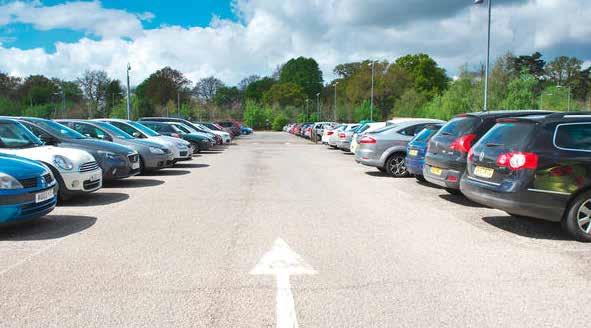
4 minute read
Allow enough time to get ready. Before

CASE BEING MADE FOR BLUE BADGES CHARITY RESPONDS TO CRITERIA-CHANGE PROPOSALS
Advertisement
4,000 people responded to the Crohn’s and Colitis UK survey into the Blue Badge system 75% of people surveyed said that they or a family member have had an accident in public because they couldn’t find parking in time to reach a toilet 91% of people who completed the survey said they (or their family member living with Crohn’s or Colitis) often struggle to go out regularly due to needing the toilet SURVEY FINDINGS N inety-five per cent of people with Crohn’s or Colitis believe their conditions should be covered by the Blue Badge scheme. This was the finding of a survey by Crohn’s and Colitis UK, which fed into the charity’s response to government proposals on changing the criteria for Blue Badge eligibility in England. Blue Badge permits give drivers with disabilities, and their passengers, access to parking spaces near their destination, and may extend or exempt time limits.
Currently, to qualify for a Blue Badge you must have difficulty walking – but the government has said reform is necessary, as Blue Badges should not discriminate between physical and non-physical disabilities. Instead, it is proposed that eligibility should be judged according to the difficulties in undertaking journeys, the barriers people face and the effect this has on people’s health and safety. In its response to the consultation, Crohn’s and Colitis UK explained that crippling stomach pains and chronic fatigue –which are common symptoms in IBD – can make walking difficult, and experiencing an accident in public can have a devastating impact on someone’s mental wellbeing and their ability to leave their home.
“When many people think of Blue Badges they often think of people in wheelchairs or with walking sticks,” says campaigns manager Andy McGuinness. “However, ‘invisible’ disabilities such as Crohn’s or Colitis can have a significant and disabling effect on all aspects of the body and a person’s wellbeing.” GOVERNMENT SAYS REFORM IS NECESSARY PARTICIPANTS SAID: “Having Crohn’s causes pain and urgent need to use the toilet as well as fatigue. Having a Blue Badge would mean not having to walk as far in pain and being able to go to the places you usually need to get to” “I have had many occasions when I couldn’t find a space nearby and ended up having to go home because I have soiled myself and it was too embarrassing to even clean myself … [It is] devastating and horrifying” A Blue Badge makes parking simpler Change is in the air +
PRESCRIPTION CHARGE PUSH
Crohn’s and Colitis UK, which co-chairs the Prescription Charges Coalition (PCC), joined other members to lobby MPs to get the government to review the list of medical conditions that are exempt from prescription charges in England. Marking 50 years since the introduction of the prescription charge exemption criteria, MPs were invited to a lobbying event in Parliament on 23 May, where politicians heard the arguments for bringing in exemptions for people with long-term conditions such as Crohn’s and Colitis. Jackie Glatter, health service development manager at Crohn’s and Colitis UK, said: “The coalition’s report, Still Paying the Price, found a third of people with long-term conditions who pay for their prescriptions have not collected their prescriptions or skipped doses due to the cost. This can have a huge impact – and could lead to admission to hospital.” This is a false economy for the NHS, added Jackie. “New economic evidence highlights that extra treatment is likely to be a lot more expensive than the amount raised through charges.” Members of the PCC also delivered to No.10 Downing Street a petition signed by more than 17,000 people, calling for an end to prescription charges for people with long-term conditions. PARLIAMENT LOBBIED ON FAILURE TO CHANGE EXEMPTIONS CRITERIA
Prescription charges apply in England only

SUPPORT WITH YOUR PRESCRIPTION (in England*)
l If you have a permanent stoma you can request a medical exemption certificate, which means your NHS prescriptions will be free. l A prescription prepayment certificate lets you get as many NHS prescriptions as you need for a set price. It costs £29.10 for three months or £104 for 12 months. l If you are eligible, the NHS Low Income Scheme could help you pay for NHS prescriptions. See the website below for details.
*There are no prescription charges in Scotland, Wales and Northern Ireland. For information on the full list of medical and other exemptions, as well as applying for a PPC, visit nhs.uk/prescriptions
SHUTTERSTOCK, MATT CARDY / GETTY IMAGES, JULIAN CLAXTON / ALAMY STOCK PHOTO
LONG-TERM STRATEGY AIMS FOR IMPROVED CARE NEW CHAPTER FOR IBD REGISTRY
The first UK-wide collection of IBD patient data has begun gathering information to ensure better care for people with Ulcerative Colitis and Crohn’s Disease.
The IBD Registry, an independent not-for-profit company, was launched by the British Society of Gastroenterology, the Royal College of Physicians, and Crohn’s and Colitis UK.
The organisation said collecting the information would help improve IBD patient care, allow the NHS to improve services and support research into the conditions. Patients of hospitals participating in the IBD Registry are asked to give written consent for their data to be used. They are given a unique IBD Registry number to protect their anonymity. The information is then used by clinicians and statisticians who are
part of a registry team working to improve IBD care across the UK.







